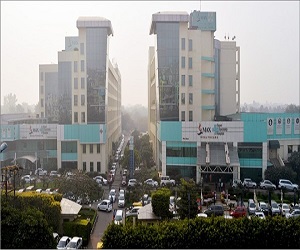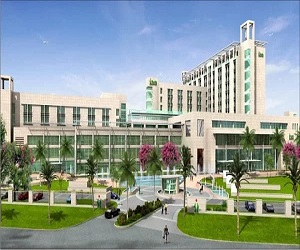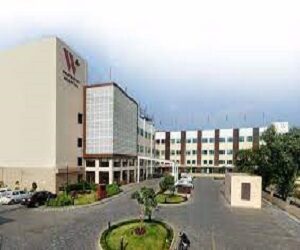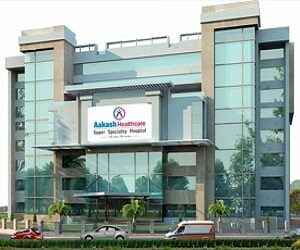VSD Closure Surgery in India
A ventricular septal defect (VSD) is often referred to as a hole in the heart. This condition may generally occur at the time of birth. In this congenital defect, the septum dividing the lower chambers of the heart, the ventricles, is not completely shaped leaving a gap or a hole. This gap allows some of the blood from the left ventricle to maneuver to the right side of the heart. The left ventricle in fact has oxygen-rich blood that must be provided to the rest of the human body. But due to this hole, it gets pumped back to the lungs which makes the heart work more to pump this excess blood all over again.
Get Opinion From Doctor
A small ventricular septal defect might cause no problems, and lots of small VSDs close by themselves. Medium or larger may require surgical repair early in life to prevent complications.
A ventricular septal defect (VSD) is normally a condition since birth. Genetic or inherited diseases like Down’s syndrome is also related to the ventricular septal defect (VSD). There are particular disorders that pregnant women may be vulnerable to which may be an explanation for ventricular septal defect (VSD) from the unborn children. Other motives may incorporate some prescription drugs, rubella (German measles), or uncontrolled diabetes.
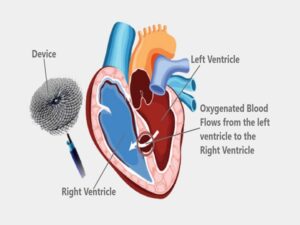
Symptoms of Ventricular Septal Defect (VSD)
The most common symptoms of the ventricular septal defect (VSD) are as follows:
- Getting short of breath especially while exercising
- Exhaustion/tiredness
- Cyanosis (a blue tint on the lips, skin, or fingernails caused by a lack of oxygen)
- Murmuring of the heart
- Abnormality in the rhythms of the heart. Also known as arrhythmias
- Extremities getting swollen
There’s a chance that the majority of the aforementioned symptoms may be regarded as another disorder completely. It might be perceived that it’s some kind of lung disease or the generic signs of aging or physical activity.
Diagnosis of Ventricular Septal Defect (VSD) :
The most commonly Pioneered Evaluations to diagnose the possibility of ventricular septal defect (VSD) Contain:
Echocardiogram: This evaluation is performed to Find out the anatomical structure of the heart, the quantity of blood pumped from the heart and its own stresses
Electrocardiogram: This evaluation monitors any Issues with the heart rhythm
Chest X-rays: Chest X-ray Indicates the dimensions and shape of their core
Coronary catheterization: This evaluation identifies the blocked blood vessels
Magnetic resonance imaging (MRI): MRI requires a comprehensive image of the heart chambers and blood vessels
Anxiety (exercise) testing: This evaluation measures the operation precision of the core under vulnerable circumstances
Treatment of Ventricular Septal Defect (VSD)
There are a variety of procedures that can be followed to treat or manage ventricular septal defect (VSD), depending upon its severity.
Observation:
Particular minor congenital heart defects found in adults won’t need any therapy as such. However, these patients need to enroll themselves for routine heart check-ups to be sure that the flaw isn’t getting severe as time passes.
Drug Therapies:
Medicines may be used to take care of some small septal defects so as to help your heart work better. These medications are given to achieve the following outcomes:
- Reduce the speed of heartbeat (beta-blockers)
- Relax blood vessels (calcium channel blockers)
- Prevention of blood clots, such as warfarin
- Discharge excessive fluids from the entire body (diuretics)
Not all medications can have exactly the exact same response for all sorts of ventricular septal defects. There’s a risk that some of the drugs that are helpful in treating a certain kind of septal defect can make another kind of septal defect worse.
Patients experiencing ventricular septal defect (VSD) are at a risk of a disease, called endocarditis. This is possible even when their flaw was fully cured.
Before the Heart Surgery
Certain pre-operative tests will be conducted prior to the operation. These evaluations will include:
Physical evaluation: Your physician will run some physical evaluations to ascertain whether you are fit to undergo the operation or not
Blood evaluations: Blood tests will decide the normal performance of the additional organs. Additionally, it will help the physician understand the blood group of the patient and if blood transfusions will be required during the operation or not.
Chest x-ray: The X-ray will disclose the illness, shape, and size of their heart
Electrocardiogram: Electrocardiogram determines the rhythm of their heartbeat
Patients will be necessary to take antibiotics prior to another surgical procedure to decrease the probability of disease. Hours prior to the surgery the patient will probably be asked not to drink or eat whatever, to bathe, and shave off any hair from the region where the surgery is going to be carried out. A particular dress is going to be supplied to the patient from the health care personnel to wear throughout the operation.
During the Surgery:
The VSD correction surgery is performed by two methods
Intra-cardiac Strategy: This is the most widely used method for treating VSD in kids. It’s an open heart operation performed while the Patient is set into a heart-lung machine or the cardiopulmonary bypass. In this procedure, the surgeon sews a patch of cloth or part of the pericardium present outside the center within the VSD. This will help to close the VSD fully and in course of time, the patch has been covered by normal tissue and also recovers completely.
Catheter Intervention: this kind of operation, it’s done via a catheter-a tube that’s conducted via the blood vessels right into the heart. Catheter techniques are ideal for small or minor septal defects and a few faulty valves.
After the Heart Surgery:
Following the conclusion of this operation, the patient with fixed VSDs must stop by a cardiologist for routine check-ups. On the contrary, patients that create other congenital problems or have some cardiac complications following the operation must continue to observe an adult congenital heart disorder expert.
Get Opinion From Doctor
Q: What other heart problems can occur with a VSD?
A. Other heart problems like leaking or narrowing of heart valves may be common in patients afflicted by VSD. Another intricate heart problem related to VSD is the tetralogy of Fallot.
Q: How do VSD develop?
A. In the womb, the heart starts out as a single tube. As this tube loops, the two bottom tubes lie side-by-side and a wall (septum) develops to complete the division of the heart into the left and right sides. The right side pumps blood to the lungs, and the left side pumps blood to the body. Sometimes this wall does not grow completely and a hole remains.
Q: What causes a VSD to develop?
A. There isn’t any specific rationale as to why a VSD forms. Genes and environment surely play a critical role. As we continue to find out more about the individual DNA, we might come to a place to learn more about exactly what causes ventricular septal defect (VSD).
Q: How is a VSD diagnosed?
A: In most cases, the ventricular septal defects are revealed after the birth of a child. By using a stethoscope the doctor can listen to the rumble of the blood as it goes through the hole. This is called a murmur. At times even if you place your hand on your chest, you will feel a rumbling. This is called a thrill. Some VSDs are not diagnosed until adulthood. Diagnosis of a VSD includes:
- Chest X-ray
- Electrocardiogram
- Echocardiogram
- Cardiac MRI
Q: Is VSD life-threatening?
Ventricular septal defects (VSD) are usually regarded as non-life-threatening, generally closing by themselves or might cause symptoms like congestive heart failure. Congestive heart failure may be treated in time to save the patient’s lifestyle.
Q: What are the long-term outcomes for adults with unrepaired VSD?
A: Little VSD might never need any therapy. But, large VSDs may have the danger of creating other cardiovascular, lung, and blood issues.
Q: What health problems are caused by a VSD?
A: VSD can result in elevated blood pressure in the lungs and can lead to cardiac failure, even if not treated promptly.
Q: How are VSDs treated now?
A: Many VSDs are treated using an open heart operation.
Get Opinion From Doctor
We offers these Services
- Providing a doctor’s opinion and proper quotation
- Selecting the best hospital and doctor as per your case
- Arranging a call with the doctor (if the case required)
- Visa assistance, Providing Visa Invitation Letter (VIL)
- Providing full guidance how to get Visa from your country
- Providing total cost including treatment, air tickets, accommodation, and food
- Assitance to book flight ticket from your country
- Arranging airport pick up/ drop
- Providing professional language interpreter
- Booking accommodation and guest house as per your budget/ prefrence
- Providing help in money exchanging
- Providing local sim card
- Arranging video consultation with specialist doctor if case requires
Fortis Escorts Hospital New Delhi
Number of beds: 310
ICU Beds: 158
Airport Distance: 19 KMs
Brief About:
- It was established in 1988 and is JCI accredited.
- Fortis Escorts Heart Institute is a premier multi-disciplinary hospital providing tertiary care and is recognized worldwide for its clinical excellence in cardiac care.
- The 310-beded hospital is a globally renowned centre boasting admirable outcomes for interventions like Cardiac Bypass Surgery, Minimally Invasive Surgery, Interventional Cardiology, Non-invasive Cardiology, Paediatric Cardiology and Paediatric Cardiac Surgery.

Medanta The Medicity Hospital
Number of beds: 1250
ICU Beds: 300
Airport Distance: 18 KMs
Brief About:
- Medanta – The Medicity is amongst India’s largest and most renowned multi-super speciality healthcare centre with 1250 beds, 29 super speciality units and more than 800 accomplished doctors.
- Supported by state-of-art infrastructure, all the departments in the hospital are fully equipped with cutting-edge technology, modular Operation Theatre and modernized monitoring systems in ICUs.
- The panel of doctors from Medanta, headed by A.S.Soin performed the first successful intestinal transplant in India.
Max Super Specialist Hospital Saket
Number of beds: 500
ICU Beds: 267
Airport Distance: 13 KM
Brief About:
- Max Super Speciality Hospital at Saket is one of the topmost healthcare service
- Providers in India. The multi-super speciality hospital has a capacity of over 500 beds, 250 functional beds. It is equipped with state-of-the-art facilities, advanced technologies.
- With the help of over 300 leading specialist Doctors, strong nursing staff, and state-of-the-art innovative medical tools.
BLK-Max Super Speciality Hospital
Number of beds: 700
ICU Beds: 175
Airport Distance: 13 Km
Brief About:
- BLK Super Speciality Hospital was established by Dr. B.L. Kapur in 1959. It was inaugurated by the then Prime Minister of India, Pandit Jawahar Lal Nehru.
- BLK Super Speciality Hospital was established by Dr. B.L. Kapur in 1959. It was inaugurated by the then Prime Minister of India, Pandit Jawahar Lal Nehru.
- BLK has a unique combination of the best in class technology, put to use by the best names in the professional circles to ensure world-class health care to all patients.
Artemis Hospital Gurgaon
Number of beds: 600
ICU Beds: 185
Airport Distance: 19 Km
Brief About:
- Artemis Hospital, established in 2007, spread across 9 acres, is a 600plus bed; state-of-the-art multi-speciality hospital located in Gurgaon, India.
- Artemis Hospital is the first JCI and NABH accredited hospital in Gurgaon.
- Designed as one of the most advanced hospitals in India, Artemis provides a depth of expertise in the spectrum of advanced medical & surgical interventions, a comprehensive mix of inpatient and outpatient services.
Treatments
Coronary Artery Bypass Grafting (CABG) cost in India
Heart Valve Replacement Cost in India
Aortic Aneurysm Repair Surgery in India
Coronary Angioplasty Cost In India
Heart Stent Surgery Cost in India
Heart Transplant cost in India
Maze Procedure cost in India
Cardiac Ablation cost in India
Fontan Procedure cost in India
Ross Procedure cost in india
Bentall Procedure cost in India
Dor Procedure cost in India
Maze and Modified Maze Procedure cost in India
Pulmonary Thromboendarterectomy cost in India
Pulmonary Artery Banding cost in India
Pulmonary Endarterectomy cost in India
Left Ventricular Assist Device (LVAD) Implantation cost in India
Mitral Valve Repair cost in India
Pulmonary Valve Replacement cost in India
Transcatheter Aortic Valve Replacement (TAVR) cost in India
Transcatheter Mitral Valve Repair (TMVR) cost in India
Off-Pump Coronary Artery Bypass (OPCAB) cost in India
Minimally Invasive Direct Coronary Artery Bypass (MIDCAB) cost in India
Septal Myectomy cost in India
Arterial Switch Operation cost in India
Coarctation of the Aorta Repair cost in India
Glenn Shunt cost in India
Norwood Procedure cost in India
Tetralogy of Fallot Repair cost in India
Transmyocardial Revascularization (TMR) cost in India
Subxiphoid Pericardial Window cost in India
Closure of Patent Ductus Arteriosus (PDA) cost in India
Atrial Appendage Closure cost in India
Homograft Valve Replacement cost in India
Arterial Bypass Grafting cost in India
Endarterectomy cost in India
Closure of Coronary Artery Fistula cost in India
Aortic Valve Repair cost in India
Atrial Septal Defect (ASD) Closure cost in India
Ventricular Septal Defect (VSD) Closure cost in India
Pericardiectomy cost in India
Cardiomyoplasty cost in India
Repair of Tetralogy of Fallot with Absent Pulmonary Valve cost in India
Get Opinion From Doctor
We offers these Services
- Providing a doctor’s opinion and proper quotation
- Selecting the best hospital and doctor as per your case
- Arranging a call with the doctor (if the case required)
- Visa assistance, Providing Visa Invitation Letter (VIL)
- Providing full guidance how to get Visa from your country
- Providing total cost including treatment, air tickets, accommodation, and food
- Assitance to book flight ticket from your country
- Arranging airport pick up/ drop
- Providing professional language interpreter
- Booking accommodation and guest house as per your budget/ prefrence
- Providing help in money exchanging
- Providing local sim card
- Arranging video consultation with specialist doctor if case requires
Sanar International Hospital
Number of beds: 130
ICU Beds: 35
Airport Distance: 20 Km
About Hospital:
- Sanar International Hospital was established in 2018.
- Sanar International Hospital founded by Mr. Naresh Kapoor.
- Sanar International Hospital offers comprehensive advanced surgical care in specialties like Cancer, Heart, Blood and Marrow Transplant, Lung, Liver, and Neurosciences along with other major departments with advanced state-of-the-art facilities.
Fortis Memorial Research Institute
Number of beds: 1000
ICU Beds: 298
Airport Distance: 17 KMs
Brief About:
- Fortis Memorial Research Institute was established in 2001.
- It is an outstanding multi-speciality quaternary care hospital,having the top-notch infrastructure, advanced equipment, highly qualified and experienced medical professionals and super sub-specialists.
- Fortis Hosptial Gurgaon is an advanced centre of excellence in Robotic Surgery, Neurosciences, Oncology, Renal Sciences, BMT, Organ Transplants, Orthopaedics, Cardiac Sciences and Obstetrics & Gynaecology.
Indraprastha Apollo Hospital
No. of beds: 900
ICU Beds: 262
Airport: 20kms
Brief About:
- Indraprastha Apollo Hospital is a flagship hospital of India’s foremost healthcare groups,the Apollo Group. It is a highly renowned multi-speciality facility that offers tertiary and quaternary care services to domestic and international patients.
- The 900 bedded hospital is outfitted with the most modern technology for diagnostics as well as therapeutic purposes.
- A team of highly trained medical professionals work under all the 52 specialities at the hospital.
Accord Superspeciality Hospital
Number of beds: 380+
ICU Beds: 41
Airport Distance: 46 Km
About Hospital:
- The story of Accord began with the thought of leveraging the new age technology with the healthcare infrastructure to serve the patients, rightly, effectively, and timely.
- Accord Superspeciality Hospital (A Unit Of SCL Healthcare Pvt. Ltd) is India’s first smart hospital and one of the first of its kind in the world.
- Accord Superspeciality Hospital aims at providing technologically advanced healthcare services to international patients who are looking out for medical tourism in India.
W Pratiksha Hospital
Number of beds: 110
ICU Beds: 31
Airport Distance: 19 KMs
About Hospital:
- Established in 1995, W Pratiksha Hospital is a 110+ bedded flagship hospital of the Pratiksha group.
- W Pratiksha Hospital in Gurgaon, the flagship hospital of Pratiksha Group is a one-of-its-kind facility in Gurgaon that brings to you 30 years of experience.
- The hospital has treated more than 25,000 people In 2018.
Aakash Health Care Delhi
Number of beds: 230
ICU Beds: 70
Airport Distance: 10 Km
About Hospital:
- Aakash Healthcare Super Speciality Hospital is a tertiary care facility, with 15 Dialysis, and 70 Critical care beds for treating the most complex cases in the National Capital Region (NCR) of Delhi, Dwarka.
- The hospital is equipped with state of the art infrastructure, latest technology, competent clinicians and compassionate staff.
- Aakash Healthcare Super Specialty Hospital is known for its leading care in Orthopaedic and Joint replacement surgery.
Jaypee Hospital
Number of beds: 525
ICU Beds : 150
Airport Distance: 32 KMs
About Hospital:
- The Jaypee Hospital was conceptualized by a revered Founder Chairman, Shri Jai Prakash Gaur in 2014, with the vision of promoting world-class healthcare amongst the masses by providing quality and affordable medical care with commitment.
- Jaypee Hospital at Noida is the flagship hospital of the Jaypee Group, which heralds the group’s noble intention to enter the healthcare space.
- This hospital has been planned and designed as a 1200 bedded tertiary care multi-speciality facility and has commissioned 525 beds in the first phase.
Get Opinion From Doctor
We offers these Services
- Providing a doctor’s opinion and proper quotation
- Selecting the best hospital and doctor as per your case
- Arranging a call with the doctor (if the case required)
- Visa assistance, Providing Visa Invitation Letter (VIL)
- Providing full guidance how to get Visa from your country
- Providing total cost including treatment, air tickets, accommodation, and food
- Assitance to book flight ticket from your country
- Arranging airport pick up/ drop
- Providing professional language interpreter
- Booking accommodation and guest house as per your budget/ prefrence
- Providing help in money exchanging
- Providing local sim card
- Arranging video consultation with specialist doctor if case requires
Treatment
Best Hospital in Hyderabad
Best Surgeon in Hyderabad
Best Cardiac Surgeon
Best Cardiologist
Best Cardiology Hospital
Best Ped. Cardiac Surgeon
Best Ped. Cardiologist
Best Ped. Cardiology Hospital
Cardiac Ablation
Cardiac Arrest Treatment
Cardiac Catheterization
Cardiac resynchronization
Cardiac Surgeon In Apollo
Cardiac Surgeon In Artemis
Cardiac Surgeon In Asian
Cardiac Surgeon In Aster CMI
Cardiac Surgeon In BLK-Max
Cardiac Surgeon In Rela
Cardiac Surgeon In Fortis
Cardiac Surgeon Bangalore
Cardiac Surgeon Gurgaon
Cardiac Surgeon Noida
Cardiac Surgeon Vasant Kunj
Cardiac Surgeon In Jaypee
Cardiac Surgeon In Jaslok
Cardiac Surgeon In Kims
Cardiac Surgeon Kokilaben
Cardiac Surgeon Bangalore
Cardiac Surgeon Dwarka
Cardiac Surgeon Patparganj
Cardiac Surgeon Max Saket
Cardiac Surgeon In Medanta
Cardiac Surgeon In Metro
Cardiac Surgeon In MGM
Cardiac Surgeon In Paras
Cardiac Surgeon In MIOT
Cardiac Surgeon In Saifee
Top Ped. Cardiac Surgeon
Cardiac Surgeon Sarvodaya
Cardiac Surgeon Vijaya
Cardiac Surgeon Wockhardt
Cardiac Surgeon Chennai
Cardiac Surgeons Delhi
Cardiac Surgeon Yashoda
Cardiac Treatment Bangalore
Cardiac Treatment Chennai
Cardiac Treatment Faridabad
Cardiac Treatment Gurgaon
Cardiac Treatment Hyderabad
Cardiac Treatment Mumbai
Cardiac Treatment Delhi
Cardiac Tumor Treatment
Cardiac Tumor Treatment
Cardiac Tumors in Children
Cardiology Surgery
Cardiology Treatment
Cardiology Treatment
Cardiology Treatment Manipal
Cardiomyopathy
Carotid Artery Stenosis
Carotid Endarterectomy
Carotid Endarterectomy
CRT-D implant
CRT-P implant
Hypertrophic Cardiomyopathy
I.C Defibrillators
Pediatric Cardiologist
Pediatric Cardiomyopathy
Pediatric Heart Surgery
Top Car. Hospital Hyderabad
Top Cardiac Surgeons
Top Cardiologist
Top Cardiology Hospital
Top Ped. Cardiology Hospital
Wearable Cardioverter
Top Doctors
Dr. Naresh Trehan
Dr. Aseem R. Srivastava
Dr. Z S Meharwal
Dr. Kewal Krishan
Dr. Rishi Gupta
Dr. Rajneesh Malhotra
Dr. Ganesh Kumar Mani
Dr. Veenu Kaul Aima
Dr. Shyam Sunder Bansal
Dr. Anoop K. Ganjoo
Dr. Ashok Seth
Dr. Gaurav Kumar
Dr. Murtaza Ahmed Chishti
Dr. K.k. Talwar
Dr. C P Roy
Dr. Sandeep Attawar
Dr. Prem Anand John
Dr K R Balakrishnan
Dr. Anil Bhan
Dr. Nidhi Rawal
Dr. Neeraj Jain
Dr. S Radhakrishnan
Dr. Adil Rizvi
Dr. Surendra Nath Khanna
Dr. Naveen Saraf
Dr. Akhil Govil
Dr. Ali Zamir Khan
Dr. Sushant Srivastava
Dr. Satbir Singh
Dr. C.J. Hemant Kumar
Dr. Sanjeev Gera
Dr. Mohammad Mubeen
Dr. Amjad M Shaikh
Dr. Sanjeev Jadhav
Dr. Nandkishore Kapadia
Dr. Anup Charles Steven
Dr. Ramji Mehrotra
Dr. Ganeshakrishnan Iyer
Dr. Aliasgar Behrainwala
Dr. N Sastri
Dr. K K Pandey
Dr. Vivek Jawali
Dr. Mukesh Goel
Dr. Rajeev Kumar Rajput
Dr. V. Narendra Kumar
Dr. Sanjeev Malhotra
Dr. Ashok K Gupta
Dr. Rahul Chandola
Dr. S. K. Sinha
Dr. Suresh Rao KG
Dr. Srinath Vijayasekharan
Dr. Ganapathy Subramaniam
Dr. Mohan R
Dr. Pradeep G
Dr. Senthilkumar D
Dr. Kailash A Jain
Dr. Ghayoor Ahmed
Dr. Vijit K Cherian
Dr. Suresh Joshi
Dr. S.S. Bhattacharya
Dr. Utpal Shah
Dr. Nitin Jain
Dr. Hasit Joshi
Dr. Sunil Thanvi
Dr. Sandeep Agarwala
Dr. Ramakrishna Pillai V
Dr. Shaji Palangadan
Dr. Anil Kumar D
Dr. Ajit Desai
Dr. Hemant Pramod Pathare
Dr. Ashish Johari
Dr. Ajay Hirakannawar
Dr. Janardhana Reddy D
Dr. Muralidharan K V
Dr. Paul Ravindran Ponraj
Dr. Sathyaki Nambala
Dr. Mukundan Seshadri
Dr. P V Rao
Dr. Pramod Reddy
Dr. Prateek Bhatnagar
Dr. Vijay Dikshit
Dr. Sanjay Kumar Agarwal
Dr. Col. M Sitaram
Dr. Kamlesh Jain
Dr. Manish Hinduja
Dr. Karri Venkata Reddy
Dr. Vidyadhar S.Lad
Dr. Zainulabedin Hamdulay
Dr. Biju Sivam Pillai
Dr. Neerav Bansal
Dr. Ashok Kumar
Dr. Manoj Luthra
Dr. Murali P Vettath
Dr. Kulbhushan Dagar
Dr. Pradyot Kumar
Dr. Vijay Kohli
Dr. Mahesh Wadhwani
Dr. Baburajan A.K
Dr. Devananda N.S
Dr. Sumit Narang
Dr. Tripti Deb
Dr. Badri Narayana
Dr. Pratap Chandra Rath
Dr. Sanjay Gupta
Dr. Gaurav Kumar
Dr. Mangesh G Kohale
Dr. Nitya Bisarya
Dr. Sridhar Reddy Peddy
Dr. P. Susheel Reddy
Dr. P. Balasubramanian
Dr. V. Umapathy
Dr. Pramod Kumar
Dr. Chander M. Mittal
Dr. S. K. Jain
Dr. Bhuvnesh Aggarwal
Dr. S.S. Iyengar
Dr. Lalchand Bandagi
Dr. Milan Kundu
Dr. Vishal Agarwal
Dr. Bhaskar B. V.
Dr. Narendra Agarwal
Dr. Vaibhav Mishra

